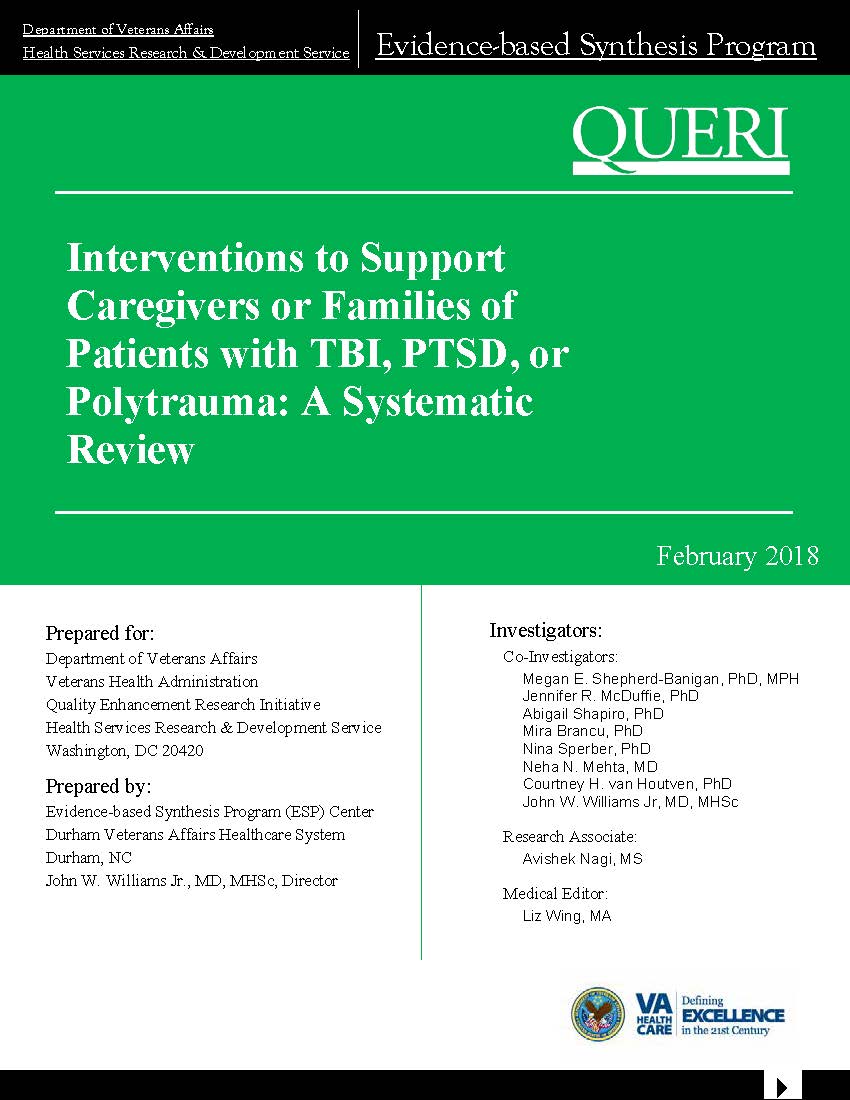
Prepared by:
Evidence-based Synthesis Program (ESP) Center Durham Veterans Affairs Healthcare System Durham, NC
John W. Williams Jr., MD, MHSc, Director
Recommended citation:
Shepherd-Banigan ME, McDuffie JR, Shapiro A, Brancu M, Sperber N, Mehta NN, van Houtven CH, Williams JW Jr. Interventions to Support Caregivers or Families of Patients with TBI, PTSD, or Polytrauma: A Systematic Review. VA ESP Project #09-009; 2018.
Download PDF: Complete Report, Executive Summary, Report, Appendices, Corrigendum
Family members perform a significant service caring for Veterans with severe physical, mental, and cognitive impairments. A family caregiver may be defined as “any relative, partner, friend or neighbor who has a significant personal relationship with, and provides a broad range of assistance for, an older person or an adult with a chronic or disabling condition." Depending on the injuries and health conditions, for some families, the need for intensive family caregiving support can last for decades. Further, caregiving can have negative implications for the caregiver's physical and mental health, employment, and financial security.
Other systematic reviews have shown that some caregiver supportive services can reduce caregiver burden and mental distress and improve care recipient function; however, this research has focused most frequently on recipients with cognitive or memory disorders and illnesses such as cancer. There is a need to better understand the impact of interventions that support caregivers or families of patients with disabling conditions common among Veterans. This evidence synthesis describes the volume of published literature evaluating the effects of family caregiving support programs for patients with traumatic brain injury (TBI), posttraumatic stress disorder (PTSD), or polytrauma.
KQ 1: For which patient groups (ie, patients with posttraumatic stress disorder, traumatic brain injury, or polytrauma) that receive interventions that involve family members has the impact on care recipient outcomes been assessed?
KQ 2: What effects do programs or strategies that involve family caregivers have on care recipient and caregiver outcomes? Outcomes of interest include caregiver burden and psychological symptoms; care recipient functional status, psychological symptoms, quality-of-life indicators, disease-specific symptoms, independence, health care utilization; and family economic status, family functioning, and clinical eligibility for specific programs or services.
Systematic Review: Interventions to Support Caregivers or Families of Patients with TBI, PTSD, or Polytrauma (Management eBrief)
Shepherd-Banigan M, Shapiro A, McDuffie J, et al. Interventions that Support or Involve Caregivers or Families of Patients with Traumatic Injury: a Systematic Review. Journal of General Internal Medicine. 2018;22/(7):1177-1186. https://doi.org/10.1007/s11606-018-4417-7.
Interventions to Support Caregivers or Families of Patients with TBI, PTSD, or Polytrauma (Cyberseminar)